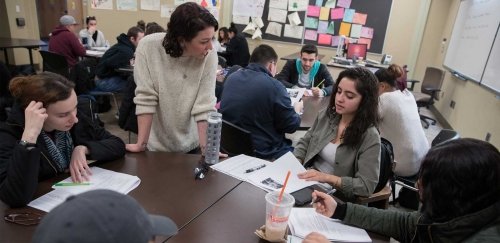
The initial assumption by many psych majors is that if they enroll in a Research Methods course they’re signing up for a semester of boredom. Not in Marcotte's courses.

RIC Assistant Professor of Psychology Melissa Marcotte teaches both Research Methods I and II – required courses. She is also a strong proponent of active learning. When you enter one of her classrooms, you won’t find students passively listening and taking notes. Marcotte lectures only 10 percent of the time and engages students in experiential-based activities the other 90 percent of the time.
A 2012 RIC graduate with dual degrees in psychology and chemical dependency studies, Marcotte said that her role in the classroom is that of a “mentor” and that she designs her curricula to engage students in activities that demonstrate their grasp of the material through collaborative group projects, independent and team research, debates and team problem solving.
In fact, group work is a staple in her courses. In her Research Methods I course, for example, students first read a chapter, and on the day the reading is due, they take a quiz. After collecting the answer sheets, her students form small groups of four or five, where they go over their answers with one another. She said, “Together, they work through questions like, ‘You answered B and I answered A. How did you come up with that?’”
Marcotte goes around from group to group to see how well her students understood the material. She calls it “eavesdropping.” Discussions can get lively and even turn into debates. She said, “If I see that a group is deep into the ‘great debate,’ I’ll suggest to them, ‘How about thinking about it this way?’ After a second, I’ll see the light bulb go off in their heads, I’ll smile and walk away.”
While checking in on each group, Marcotte is also taking mental notes of which questions students are having the most difficulty with. “I may notice that they’ve all breezed through the first three questions but everyone seems to be getting a different answer for the fourth question,” she said. “I’ll remind myself to take more time going over that question with the entire class.”
Finally, the questions on the quiz are opened up to the entire class and everyone is invited to contribute. “It’s like a game show, at that point, to come up with the right answers,” said Marcotte. “When we get to the fourth question, I tell them, ‘This question brought up a lot of conflict. Let’s talk about why the answer was A and not B.”
Finally, Marcotte will average each student’s individual and group quiz grade, which underscores for students how working together can bring up their grades.
“I believe students learn more from working through problems together than they do when the professor stands in front of the classroom and talks at them,” she said. Active learning promotes numerous 21st-century skills, including critical-thinking skills, problem-solving skills, collaboration, negotiation and oral communication.
Studies have shown that active learning also promotes better recall and understanding of the material than standard teaching methods because students are actively engaged with the content.
“Almost everything I do, as far as active learning, is built on the shoulders of giants,” Marcotte said, referring to her former RIC professors: Barbara Anderson, Beverly Goldfield and Beth Lewis, all of whom incorporated some form of active learning in their classrooms and research labs.
She particularly benefitted from the experiential learning gained through her work in Goldfield’s research lab as a statistician and methodologist for a year and a half. “My research experience, I believe, had everything to do with why the University of Rhode Island accepted me into their Ph.D. in psychology program with only a bachelor’s degree,” she remarked. “Most of the students in my cohort came in with master’s degrees, but URI saw that I had the same amount of research experience as my cohorts.”
Marcotte graduated from URI with a Ph.D. in psychology in 2017 and has taught at URI, the Rhode Island School of Design and now RIC.
She said she is delighted to be back teaching at her alma mater. “RIC students are sponges for the information,” she said. “They really want to learn the material in a practical way, and they are some of the most dedicated students I have ever encountered. It is my honor to pay forward the mentorship that was afforded to me as an undergrad and I am very encouraged by the growing number of initiatives at the college to help our students succeed.”
RIC’s Department of Psychology offers summer mentoring, internships, research opportunities as well as a dual degree program in chemical dependency and addiction studies.
